Several People From Our Family Have Visited the Washington Monument in Washington, D.c.
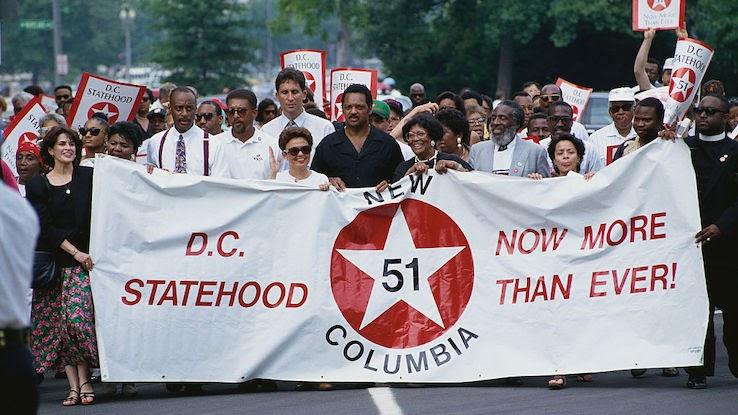
While Washington, D.C., might be home to some of the most powerful and influential government institutions in the globe, this city has too floundered inside a grey area betwixt districthood and statehood throughout its existence. Many residents feel powerless to influence the results of local and national elections thanks to the district's not-traditional condition and historically unfair voting policies, which continually raises the question of whether D.C. would ultimately do good from being granted statehood status.
The past year has been i of meaning and remarkable change and disruption in many ways, and even D.C. has gotten its fair share of attending in the midst of the coronavirus pandemic and one of the more than significant presidential elections in recent history. With the House of Representatives' belatedly-June 2020 approval of a nib that would grant the district statehood — and a revival of this push expected with some other Firm vote on the week of April nineteen — the thought has once once again gained meaningful traction.
While many residents of D.C. are more than ready for their commune to get the 51st state, at that place are all the same some hurdles to clear before they accomplish legal and political equity with other U.S. citizens. Merely all things considered, with its prominent role in and rich contributions to U.S. history, D.C.'s statehood may seem long overdue.
D.C.'southward Early Days Saw Flourishing Growth
Washington, D.C., has a history that's most as old as the country it'due south the capital of. In the summer of 1790, Congress passed the Residence Act, which included provisions for establishing a national capital and permanent seat of authorities located on the Potomac River. The then-recently ratified U.South. Constitution also provided for a special administrative federal district that would fall nether Congress' exclusive jurisdiction, which is the chief reason why D.C. was never originally function of whatever U.Due south. country.
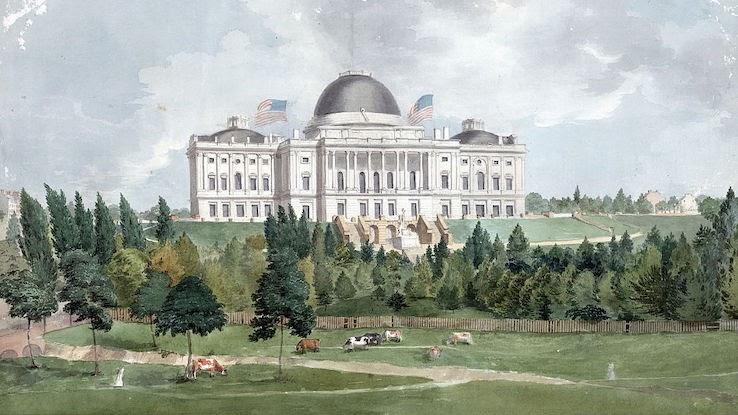
Both Virginia and Maryland donated portions of their Alexandria and Georgetown settlements, respectively, to create the commune, part of which was initially named the City of Washington — after that George, the Founding Father and beginning president who selected D.C.'due south location. Interestingly, the Constitution specified that this commune would be no larger than "ten miles foursquare." Thus, D.C.'s original purlieus was a foursquare, each side of which measured 10 miles long — a shape that's more often than not however the perimeter today.
In its first few years of beingness, the district only housed a few thousand people, many of whom moved in temporarily to work for the politicians beginning to settle in the area. As D.C. started to take root, information technology underwent a few proper noun changes, with commissioners and others eventually choosing Columbia — the female personification of the Usa as a "goddess of liberty." Congress held its outset session in 1800, and in 1801, it officially enacted a law to formally place D.C. under exclusive federal and Congressional control.
From that point forward, Washington, D.C., became the official backdrop for a number of iconic milestones in the early on 1800s, from landmark Supreme Courtroom cases to the Louisiana Purchase to the War of 1812. Unsurprisingly, there wasn't much business concern about D.C.'s potential statehood during this time; the state was busy finding its footing, expanding its boundaries, funding expeditions, inaugurating new presidents and even rebuilding D.C. after British forces burned down regime buildings during an 1814 raid. Residents did brainstorm discussions nearly suffrage, having lost their right to vote once D.C.'s state was no longer office of any state. Life in the district was far from placidity, though, and it was about to get even more than interesting.
Later on four long years of mortality and tumult, the American Civil War ended in 1865 with the Spousal relationship challenge victory. This marked the commencement of the reunification process of the states and the official end of slavery, but formerly enslaved people didn't have the same rights and opportunities equally other citizens or immigrants; they faced continued prejudice and violence at the hands of their white countrymen.
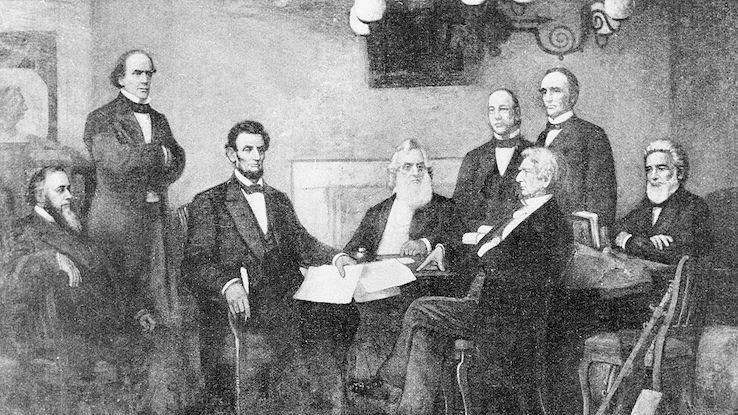
D.C.'s population of people who were formerly enslaved boomed later the end of the Ceremonious War, and, for a few years, things went well for the growing African-American communities in the district. Though women were withal restricted from voting in federal and local elections, Black men fought for and won the right to vote in D.C.'s municipal elections in 1867. For a brief time, these residents had democratically elected representatives within the local government.
But racism and command endured. In the 1870s, Congress abolished D.C.'south local governmental privileges and processes, including its ability to elect a mayor. This allowed the president lonely to appoint the district'southward governor and quango, which replaced D.C.'southward territorial government in 1874. Instead of allowing the predominantly African-American population to vote for presidents, Senators and Representatives, new legislation gave the acting Commander in Chief full reign over selecting D.C.'s officials.
When a push for statehood began during this period, Senators and other lawmakers used racist justifications to instead strip D.C. of its governance rights, fearing how a bulk-Blackness voting body might touch on their privilege. They continued pushing this grounds for denial of voting rights for Black people, especially when a proposal for D.C. potentially being granted Congressional representation was introduced in 1888. Information technology took over xxx years for Congress to begin holding hearings on the matter and only resulted in a beak that would've allowed Congress to treat the district'south residents as citizens of a U.Southward. state — had it fifty-fifty passed.
Representation Is Redefined in D.C.
In 1961, residents of D.C. secured the correct to participate in presidential elections post-obit the Twenty-third Subpoena to the Constitution. However, this change came with a caveat that limited the customs's potential power. Today, as it was in 1961, D.C. is only allowed three electors to vote on behalf of residents during presidential elections — which, for a bustling metropolis of over 710,000, doesn't seem like that many, especially because that Wyoming (population: 580,000) also has three.
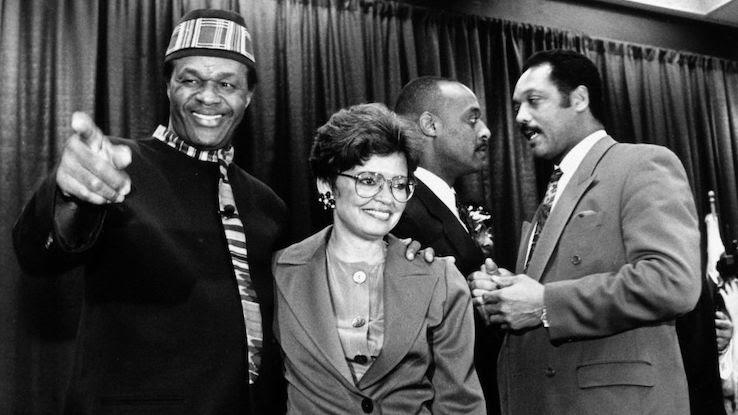
Consequently, the community'due south vocalism wasn't as loud as many residents felt it rightfully should've been; in the political epicenter of the nation, people who lived in D.C. felt they were underrepresented politically. But soon after they gained the ability to vote for president, D.C. residents obtained another authorities victory that buoyed them — for a while. Past 1971, the commune had been granted a single Representative to the House, and, in 1974, elections for Mayor of the District of Columbia over again became ane of the nearly effective ways for citizens to exert influence on local politics.
Notwithstanding, there was ample open up discourse on the topic of D.C'south ability to cocky-govern, along with its demographics. This soapbox endures today, and it has some politicians worried. Voters in Washington, D.C., near universally elect democrats — in the 15 presidential elections D.C. residents have participated in, they've voted for the democratic candidate xv times. This has caused more a little hesitation on behalf of some republican lawmakers and politicians, every bit those in power worry that a semi-autonomous D.C. might never elect a republican or conservative-leaning official ever over again.
In add-on to this, a common argument against D.C.'southward statehood is that New Columbia, a proposed proper noun for the potential state, would take the ability to exert excessive influence on the federal government because of its concentration of political institutions. The U.South. government would terminate up relying on one state for the majority of its operations — a state that would begin voting for the best interests of its people instead of the institutions inside it.
Many Supporters Argue Information technology'due south Past Time for Change
Proponents of D.C. statehood have enough of counterarguments upwardly their sleeves, chiefly that the commune'due south residents contribute massively to the success of the U.Due south. regime but have nobody in that government — at least not in Congress — fully representing them. They're responsible for funding the federal authorities with taxes and following the laws information technology enacts, but they don't "enjoy the benefits and protection of having voting representation" and "this situation is merely not fair," explains Senator Thomas Cynic of Delaware. In addition, this disenfranchisement is a clear violation of civil rights in a democratic society, and D.C. statehood supporters believe this needs to be corrected.
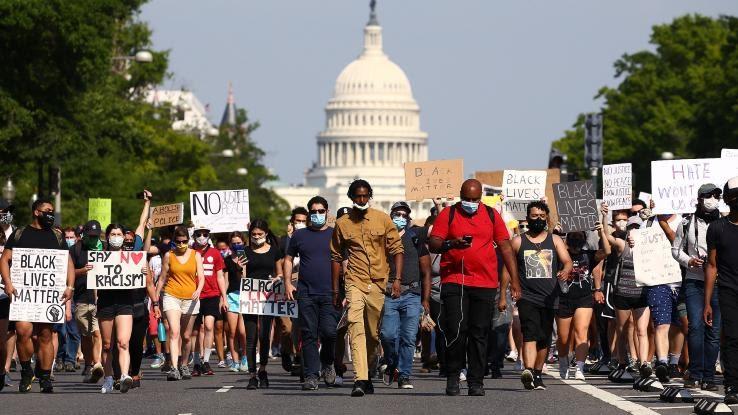
Supporters also dispute the argument that historically and constitutionally D.C. was only meant to be the seat of the federal government by acknowledging that the Constitution has enshrined a number of other injustices, such as slavery and the disenfranchisement of women, that were later corrected. Like changes could be made for D.C. instead of relying on the words of a 230-twelvemonth-old certificate that no longer reflects the desires of the populace those words govern.
The District of Columbia is home to nearly three-quarters of a 1000000 year-round residents — which ways that there are currently hundreds of thousands of people living in the The states who lack local representation simply because of where they live. These are hundreds of thousands of people who "[pay] more than in federal taxes than 21 states and more per capita than any country." The residents of D.C. accept been fighting — and paying — for increased representation for more than than a century, and many argue that it'due south past time they go their dues.
While D.C. does have its single Representative in the Business firm, this official is technically a delegate who doesn't wield the same power as Representatives from other states and cannot vote on proposed legislation. Additionally, the district has what are called shadow Senators "to push for D.C. to become the 51st state" by maintaining a presence within Congress; however, these politicians cannot participate in full floor or commission votes. Statehood supporters argue there's no reason to go along treating the residents of D.C. like second-class citizens past barring them from enjoying the same voting rights and representation every bit everyone else in the country.
What Does the Future Agree?
In June of 2020, a motion to grant statehood to D.C. was approved past the Firm of Representatives, just this beak, titled the Washington, D.C., Admission Act Hr-51, died months after at the end of the 116th Congress. But times are changing: D.C. residents have continued belongings out hope, and politicians have continued the push. The Admission Act was afterwards revived in January 2021, and a companion bill, titled Southward.51, was also introduced that month with provisions to allow D.C. to join the Marriage every bit a country named Washington, Douglass Commonwealth. Both bills would give the new republic equal political footing with the other states in the country, and these pieces of legislation immediately began picking upwards plenty of steam in the months post-obit their respective resuscitation and unveiling.
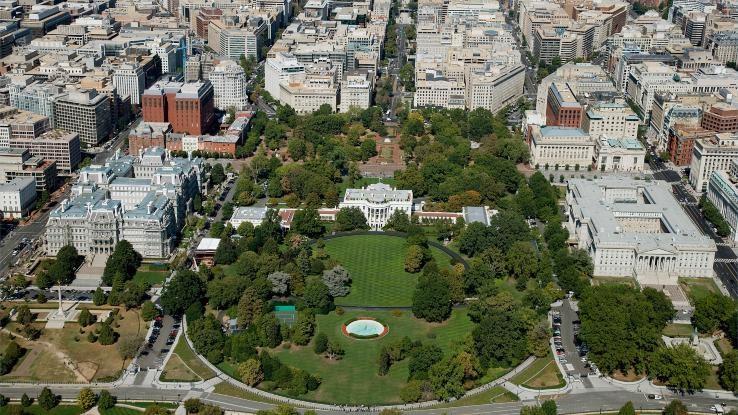
In March of 2021, a Congressional hearing took place among the House Committee on Oversight and Reform to gauge support for HR-51, and a vote among all Business firm members is likely to come up on the calendar week of April xix after committee members marking upward the bill — a procedure that allows for editing and rewriting in training for a full vote — on Apr 14. If the beak is approved in the House it volition one time once more advance to the Senate, where information technology "faces long odds" and the legislative filibuster as a likely obstacle.
Regardless of the issue of the upcoming vote, information technology's unlikely D.C.'s residents volition give upwardly the fight for off-white representation. Every bit politicians realize the total importance of creating and enacting legislative changes that run into the demands of the public, and as D.C. locals keep to challenge the condition quo, the commune'south rise to statehood may exist growing ever nearer — at last providing the representation people are fighting for.
crothersnuied1997.blogspot.com
Source: https://www.reference.com/geography/why-isnt-washington-dc-state?utm_content=params%3Ao%3D740005%26ad%3DdirN%26qo%3DserpIndex
0 Response to "Several People From Our Family Have Visited the Washington Monument in Washington, D.c."
Postar um comentário